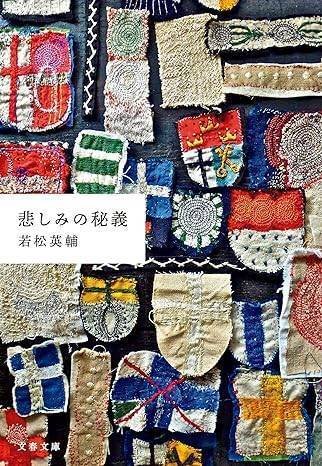
【Random notes】Instantaneous English Composition Training(Book report edition@2023/12/23)
architecture/dailyfundamentalsさん撮影
普段、技術英文しか書いていないので、ちょっと気分転換も兼ねて、漫然と気の向くまま(漫文)に、「題目」を設定し、英作文してみました(^^)
ん~英文にした際に、お手本とした日本文のニュアンスと異なるなと感じた英文の箇所については、復習も兼ねて、適宜、修正していきたいと考えています( `ー´)ノ
The title:Invisible Tears ~The Poetics of ”Kanashimi”~
[テキスト]
「見えない涙」若松英輔(著)

There is a poem by Kenji Miyazawa titled "無声慟哭".
Silent means voiceless.
Lamentation means weeping with a strained voice.
The character for dog is set in wailing, but the word indicates that the crying voice can sometimes even be bestial.
However, Kenji says that when lamentation reaches its extreme, it will cry without voice.
Strange as it may sound, it is true.
People do not always cry out loud when they cry.
Likewise, sad people do not always cry with tears.
When they are truly sad, their tears run dry and continue to flow through their chests in an invisible form.
Many people have had these experiences.
If this is the case, then there may be sadness deep in the heart of the person who is smiling in front of us.
In fact, when a person is in the depths of sadness, he or she may smile in an attempt to keep others from realizing it.
That is one way to think of it.
The etymology of the Kanji "悲" is that the "非" represents the feathers opening in opposite directions, meaning that the feathers split in both directions.
This is the origin of the word "非"+"心", which is said to mean that the heart is split open, and that the sad feeling of having one's heart ripped open is the true meaning of the word "sadness".
As for the etymology of "哀", the word "哀" is composed of "口" and "衣", with "口" sandwiched between "衣" from above and below.
From there, the word "衣" has the meaning of wrapping and hiding, and the word "口"+"衣" represents holding one's feelings in one's heart and hiding one's mouth to express sadness.
When we see an injured person in front of us, he or she cannot talk about their wounds, and we cannot easily express their feelings in words.
Therefore, we mourn while covering our mouths with our clothes, I suppose.
It reminds me of the Zen word "君看よ、双眼の色、語らざるは愁い無きに似たり".
【参考記事】
【関連記事】
【改訂版】【読書メモ】「まとまらない言葉を生きる」荒井裕樹(著)
https://note.com/bax36410/n/n0be21a61a1ac
Also, ”Kanashimi” can be expressed with various kanji.
For example, "悲しみ", "哀しみ", "愛しみ", "愛しみ", and "愁しみ".
The word "sadness" has the words "悲痛" and "悲嘆", but Kenji Miyazawa used the word "悲傷" in his poem.
This is the "Kanashimi" that almost shatters your mind and body.
"哀しみ", as written "哀れ" and read "あわれ", is the action of feeling ”Kanashimi” of others as if it were our own.
"愛しみ", the word tells us that sadness means the loss of a loved one.
Sadness is also the discovery of love.
"美しみ", this word shows us that there is beauty lurking in the depths of sadness, and that those who live in sadness are indeed beautiful.
"愁しみ", the poet Chuya Nakahara used this word frequently.
With this word, Chuya expressed his feelings when he was touched by the ”Kanashimi” of history or humanity, transcending his own ”Kanashimi”.
It is not that there are five different Kanashimis.
The history of the word "Kanashimi" tells us that there are at least five "Kanashimi" exist in a way that overlaps.
I believe that everyone has experienced unbearable "Kanashimi," or suffering.
There are times in our lives when we are faced with trials that make it difficult to continue walking.
At such times, it is words that serve as our "cane".
Words are invisible.
However, when we are in great difficulty, we can stand up by holding a few words in our hearts.
If we can find words that are our "cane", we can hand them to those who cannot find them well.
【参考書籍】
「悲しみの秘義」(文春文庫)若松英輔(著)

「生きていくうえで、かけがえのないこと」若松英輔(著)

「弱さのちから」若松英輔(著)

「光であることば」若松英輔(著)

「詩集 美しいとき」若松英輔(著)

「詩集 燃える水滴」若松英輔(著)

【参考資料】
デジタル大辞泉 「悲しみ」の意味・読み・例文・類語
かなしみ【悲しみ/▽哀しみ/▽愛しみ】
1 悲しむこと。悲しい気持ちや心。悲嘆。「―の色を浮かべる」「―に暮れる」⇔喜び。
2 (愛しみ)いとおしむこと。情愛。
「末世の衆生に親子の―深きことを知らしめんがためなり」〈今昔・四・一〉
[類語]悲嘆・傷心・愁嘆・痛哭・哀傷・感傷・痛嘆・慨嘆・嗟嘆・長嘆・嘆き・嘆く・嘆ずる・嘆き明かす・嘆き悲しむ
【関連記事】
【Random notes】Instantaneous English Composition Training(Diary Edition@2023/12/21)
https://note.com/bax36410/n/na300148fa075
【Random notes】Instantaneous English Composition Training(Business Skills edition@2023/12/22)
https://note.com/bax36410/n/n98d9866425fe
【Random notes】Instantaneous English Composition Training(Book report and Translation edition@2023/12/24)
https://note.com/bax36410/n/n1129bcac9b0e
【Random notes】Instantaneous English Composition Training(Diary and Translation edition@2023/12/25)
https://note.com/bax36410/n/n366840f35f42
【Random notes】Instantaneous English Composition Training(Diary Edition@2023/12/26)
https://note.com/bax36410/n/nedd3dc8bf4e0
【Random notes】Instantaneous English Composition Training(Diary Edition@2023/12/27)
https://note.com/bax36410/n/n13142d2060b5
【Random notes】Instantaneous English Composition Training(Book report edition@2023/12/28)
https://note.com/bax36410/n/n25b766b7c7ac
【Random notes】Instantaneous English Composition Training(Diary Edition@2023/12/29)
https://note.com/bax36410/n/n5547f7c94895
【Random notes】Instantaneous English Composition Training(Diary and Translation edition@2023/12/30)
https://note.com/bax36410/n/nb1973f862804
【大晦日カウントダウン記事(8:00)】【Random notes】Instantaneous English Composition Training(Diary and Translation edition@2023/12/31)
https://note.com/bax36410/n/nca008f31193c
この記事が気に入ったらサポートをしてみませんか?
